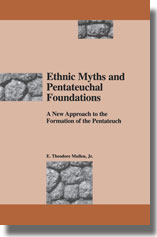
$39.00
Most interpretations of the Pentateuch depend upon analysis, identification, and dating of reconstructed sources. This book presents a new interpretive model which views the Pentateuch as documenting the foundation of a distinct ethnic and religious group. The author argues that the Pentateuch was composed in Judah during the Persian period in response to threats to the community resulting from foreign domination. The various materials from which the Pentateuch was composed are understood as constructing religious and social boundaries which served to create the group's ethnic identity. Emphasis is placed upon ways in which selected texts may have been publicly read as means of constructing and maintaining such identity. Problems of historicity are thereby avoided, and light is shed on the process by which these public texts as "ethnic myths" came to be regarded as scripture within a particular religious tradition. In so doing this work advances understanding in the areas of scriptural formation and early Judaism, as well as in the anthropoligical understanding of ethnic boundary formation.
